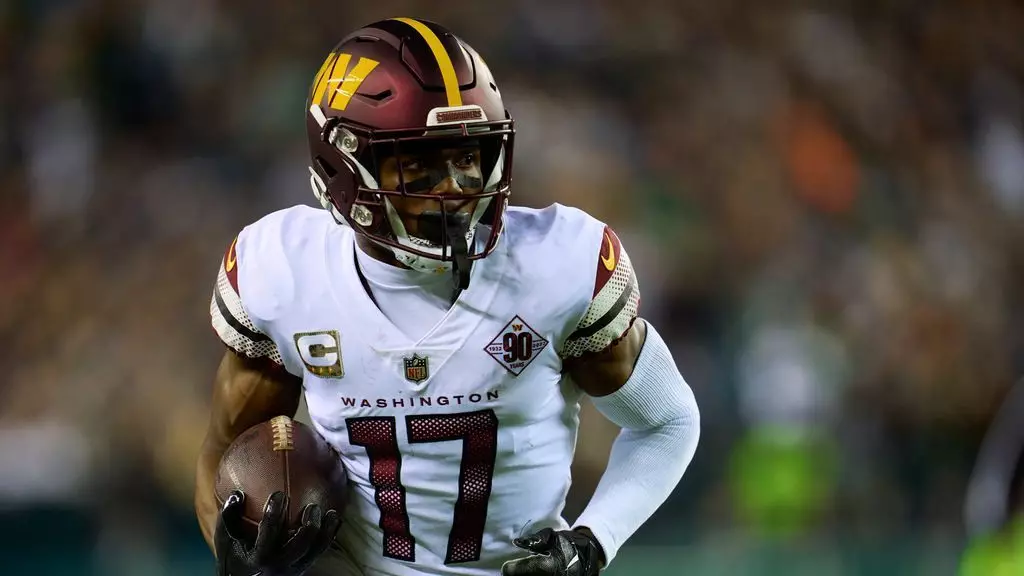In today’s NFL landscape, player frustration with contracts and perceived undervaluation has become a defining theme. The case of wide receiver Terry McLaurin embodies a shift in athlete mentality—no longer content with just performance, these players are vocal in seeking financial justice. McLaurin’s trade request underscores a paradox: despite being a franchise cornerstone, he feels undervalued as he nears the twilight of his prime years. This phenomenon highlights a broader truth about the league – players today are more aware, more outspoken, and less hesitant to challenge the status quo. The rise of social media, player empowerment, and transparent negotiations contribute to an environment where loyalty is often tested by the pursuit of equitable compensation.
The NFL’s economic model is undergoing existential scrutiny. Teams, including Washington, grapple with balancing the desire to retain top talent with the financial realities of cap restrictions. McLaurin’s case—his outstanding production, multiple 1,000-yard seasons, and two Pro Bowl appearances—should command a first-rate contract. Yet, management’s reluctance to meet his demands reflects a lingering undervaluation of receivers, especially as they near 30. The league’s tendency to prioritize youth and longevity places future value above consistent productivity, creating tension between players and teams. Such dynamics threaten to erode long-term loyalty, transforming relationships into negotiations fraught with tension and unmet expectations.
The Intricate Dance of Negotiations and Player Management
Negotiation in the NFL has always been a high-stakes game—sometimes a chess match, sometimes a gamble. Washington’s stance, citing the high market value of a player like DK Metcalf as a benchmark, reveals the difficulty of setting fair market prices that reflect a player’s true worth. McLaurin’s contract demands—around $32 million per year—are rooted in his consistent production and potential, yet the team perceives his age and future value differently. The gap between player expectations and team budgets often becomes an impasse leading to trade requests and hold-ins.
We see coaches like Dan Quinn emphasizing professionalism and emotional resilience in the face of internal strife. Quoting that “trade requests are normal business” isn’t just a passive statement—it’s a reflection of an existing paradigm in the league. Yet, the question remains: how sustainable is this model? Is it healthy for players to operate under constant uncertainty about their futures? And what does it say about the league’s prioritization of short-term competitiveness over player well-being? While Quinn aims to appear supportive and measured, the underlying tension demonstrates a fragile ecosystem where disagreements threaten to fracture team cohesion.
The process of negotiation—often characterized by silence, strategic leaks, and public diplomacy—adds to the volatility. McLaurin’s decision to hold out for four days and his subsequent trade request is not just an act of frustration but a signal to the league: players are becoming more willing to leverage their value actively. As the league continues to emphasize analytics and performance metrics, it must confront its complacency regarding fair compensation and player satisfaction. When a key player like McLaurin feels the need to seek greener pastures, it suggests that the league’s current economic strategies are incomplete and perhaps even unsustainable.
Strategic Loyalty Vs. Personal Fulfillment: The New NFL Reality
McLaurin’s commitment to his team, despite the contractual saga, exemplifies a new kind of loyalty—one that coexists with a desire for equitable recognition. His consistent performance, coupled with respect within the locker room and a genuine connection with fans, makes his trade request all the more provocative. It’s a testament to the fact that NFL stars are not mere commodities—they are individuals seeking to safeguard their futures, personal dignity, and recognition for their contributions.
The broader NFL ecosystem stands at a crossroads. Will teams recognize that their star players are more than statistics and cap hits? Will franchise owners and management respect the nuance of these negotiations, or continue to treat players as interchangeable assets? The league must evolve from a model rooted in loyalty to one emphasizing mutual respect, fair compensation, and transparency. McLaurin’s situation could ignite a shift that forces clubs to revisit their overall philosophy—embracing a more player-centric approach that values loyalty seen not just in contract longevity but in a shared commitment to success.
In the end, the NFL is a league of star power, business savvy, and emotional investment. Players like McLaurin are no longer willing to be silent about their worth—they demand acknowledgment and fairness. As this dynamic continues to unfold, it may well set the stage for a future where player empowerment becomes the norm, and the league adapts to prioritize both competitiveness and compassion. Only time will tell if the NFL can reconcile these competing values—one thing remains certain: the game is changing, and it’s high time those changes favor deserving players.

